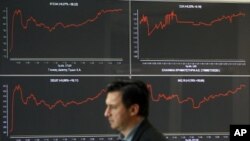Markets rose sharply on news of European leaders reaching an agreement vital to solve the region's huge debt crisis. The deal is aimed at preventing the crisis spreading to larger eurozone economies like Italy, but analysts say more detail is needed if the crisis is to be contained.
Two years of crisis in the eurozone came down to this Brussels summit.
Europe’s leaders met through the night. After 11 hours of talks - with many journalists sleeping in the press room - German Chancellor Angela Merkel was among the leaders to emerge hailing a breakthrough.
“I am aware, and everybody was aware that the whole world was looking at this meeting,” she said. “That we can show the world how we can guard ourselves from this deep economic crisis. And I think that tonight we Europeans have taken the right measures.”
Global markets agreed. Share indices across Europe, Asia and the United States all showed early gains Thursday.
But the optimism may be short-lived, says Tobias Blattner, European economist at Daiwa Capital Markets.
“Now the question is obviously, ‘How long will it last?’ And I think this is where we are skeptical and we think it will be a very short-lived episode simply because the summit yesterday left too many questions open," said Blattner.
Eurozone leaders agreed a three-pronged approach.
Banks will be recapitalized with 100 billion euros. Greece’s debtors will be asked to write-off half of the debts, and the European bailout fund will be ‘leveraged up’ to about a trillion euros to try to cover other indebted countries like Italy or Spain.
Not good enough, says Simon Tilford, chief economist at analyst group the Center for European Reform.
“There is no new money involved," said Tilford. "What they are essentially saying is that we will cover a proportion of your losses if these countries get into funding difficulties. Now the question is whether that will be enough to persuade investors to lend to countries. It is not clear it will be.”
In Greece, which faces years of austerity cutbacks under the bailout, reaction was despondent.
One man said, "I do not believe it was a good deal, but it was inevitable. At this moment, Greece has gone bankrupt."
Another man added, "It is a dark and shady deal. Everything here gets worse by the day. God help us."
Investors’ concern is turning to Italy. Debt in the eurozone’s third-biggest economy is 120 percent of GDP.
In Rome, the deal was greeted with skepticism.
"I think it all stems from the fact that we are not credible anymore,” one commuter said.
“I do not think this government is capable of managing this crisis situation,” said another.
In a week, many of the European leaders will reassemble at the G20 summit in France. There, analysts say Europe will look for international support from countries like China to help bolster the debt deal.















